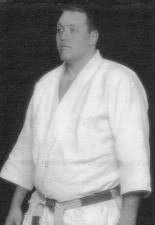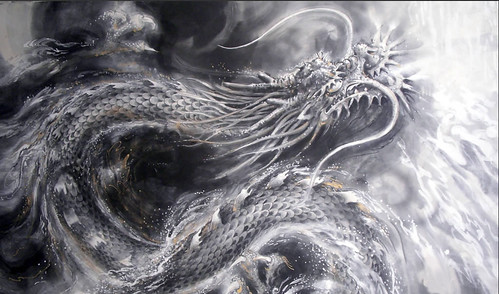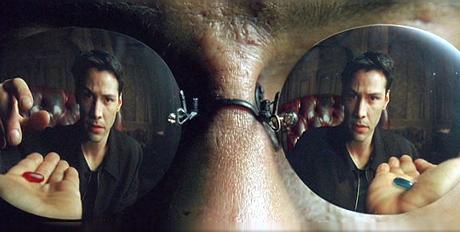"Cool! Congrats on getting some students up to shodan. Your work on the basics and fundamentals can really take off now."
Is there anything beyond basics? If so I have not found it yet. It just gets more and more basic as I train.

After slicing up the film of my guys demonstrating the 17, I noticed they had a real hard time moving from the center during testing conditions. Something they normally do fairly well. One of the basics.
One of the things we practice a lot at the Dojo is posture -nothing more basic than that! Usually good posture indicates moving from the center, and letting your weight do the work. One of the tell tale signs that ineffective Aiki is going on is the feet stop moving and the upper body hunches forward. Basically what is happening, is the mind says "throw now"...the body braces...and the muscles of the upper body fire to make the throw happen.
So it makes me wonder what changes in the testing conditions...that makes someone comfortable moving from their center, into someone who uses muscular force? We are all guilty.
pressure, intent, desire to throw....all screw up a perfectly good aiki moment.
When Lowry Sensei came down, he spoke a lot about Hazumi and Ikioi.

Hazumi -- defined in kudo's "judo in action" as a the force/ momentum that acts on the guy from your entire center moving ie. the effect of one center of gravity on another.
Ikioi --is the impetus of an isolated part of the body acting on the person.
In my current practice I am still guilty of too much muscle (ikioi) and not enough hazumi, just like my guys.
I really feel like the key from switching from being a Ikioi player to a Hazumi player is by switching intent.

Here are some of the things I have been trying to retool in my head to change my intent - back to the basics of the art.
- I must no longer desire a goal in an encounter
- I must lose my attachments to ideas of victory.
- I must stay sensitive to where my partner wants to move me...then I must go there on my terms with correct body structure.
- for some reason the idea of "surfing the energy" has been on my mind lately, rather than trying to control or do anything in particular.
- I must stay true to the principles of the art at all times. I will never fear defeat in the safety of the dojo. If my Aiki fails in an encounter...then ukemi is a way to reestablish the harmony.

So these are all the basics I have heard since my first day in the dojo. I guess it is one thing to hear them, and another to do them and have them so internalized you have no other choice but to move in harmony with them.
All these basics get kind of complicated. These basics are too advanced!







Hmmm...
ReplyDeletegood ideas you have there. I think you are on the right track...
But it seems to me like "to no longer desire a goal in an encounter" is against human nature.
You have to have goals/desires. Or perhaps I should say, I don't think you can avoid goalsetting. What is important is to get your goals set right. (and you have to do that beforehand, before the conflict makes you crazy)
For instance, it is futile to set a goal to...
- punish the bad guy for attacking you
- try to literally "throw" something person-sized
- try to control uke's response to your technique - as in, "you have to fall this way for my technique to succeed"
better, more reasonable goals would be things like...
- try to evade at ma-ai and push yourself off of uke to get back outside ma-ai
- try to stay upright by keeping your feet in motion under you.
- try to bounce off of uke using unbendable arms to interact with him.
I think we're probably saying about the same thing, just different ways.
A Judo man much wiser than me once said, "There's nothing more advanced than the basics." You've outlined several key elements for practice. Everybody should take note, because most of us can take a lesson and genuinely try to implement exactly what you're talking about.
ReplyDeleteDemonstrations (tests) are a neat tool for stimulating the adrenaline response systems of the body. The scariest demo I've ever done was for yonkyu (green). It was the first promotion, and I'd much rather demonstrate all of Koryu Dai San and half of Koryu Dai Yon (San Kata & Yon Kata; material for Sandan rank demonstration) with full formalities and all the optional techniques than do my green belt demo again. It was purely petrifying.
I used to shoot IPSC -- action/combat shooting years and years ago. When I tried to shoot my best stage regardless of everyone else, I placed pretty well. But if I started trying to go faster to beat guys who were far better than I was.... well, it just didn't work out. If I didn't try to win I could usually keep pace with them.
I agree that shifting play into ikioi demands a change in mindset. Genuinely not caring about an outcome, with respect to win/lose, is paramount. One of my Aikido buddies in Arkansas has a note on his board stating, "Abandon the concept of win/lose. If you cannot, practice losing more." Only by transcending our desires and the win/lose mentality can you have real aiki.
Surfing the energy is a nice way to describe aiki. It's following motion, and to do that you must be sensitive to your partner. Follow them in principle, and you've done it.
If one expects victory, one becomes overconfident and loses. If one expects defeat, one shall be too worried, and defeat is ultimately the result.
ReplyDeleteWhen one is tested in a formal manner, they have only two options: Succeed, or fail. Thus, they view their options, forgetting that their minds must be focused on what they are doing constantly.
So how does one concentrate on the task at hand in order to succeed? By not concentrating. Avoid success or failure by achieving neither, and focus by losing focus.
If that makes any sense to you ^_^
i beg to differ with Pat-- desires and goals while typical are certainly not necessary nor are they inescapable "human nature" (though I also agree with Pat that some goals serve our purposes better than others-ultimately even good goals and desires fall away)
ReplyDeleteThe Seeking mind can only carry us so far and then comes a time for the non-seeking mind-- the non-dual
in budo training and in life i find goalessness a pretty important place to inhabit
sounds like Eric is awakening his Zen mind
transcending victory and defeat, being swayed by neither fear or desire, remaining open on all sides and riding the energy-- mushin mugamae all the way-- well put Eric
I understand what you guys are saying - sorta - I think. But maybe not...
ReplyDeleteIn a conflict, you want to survive. That is human nature and it is a goal, or a desire. Not only that, but it is probably not a desire that you want to rid yourself of.
Going further, you want to remain standing, stay in motion, etc... to the extent possible, or if forced to the ground you prefer to fall safely rather than reflex a hand toward the ground and land on it...
Sure, I agree that you have to avoid getting bogged down in winning, scoring more points, looking cool, showing the bad guy up, punishing, etc... because that sort of goal screws up both your performance and your soul.
But even if it were possible to transcend what Nick called 'good goals', why would that be a good thing, to transcend a desire to survive a conflict (for instance)
in my experience, in a real conflict you just allow internalization of training (the unconscious) to solve the problem at hand with out reflection, desire, descision -- survival as a goal in the midst of the struggle is an abstraction. on this level even the desire to cling to life is "extra" and anything extra is a distraction from moment to moment the matter at hand
ReplyDeleteHmmmm... Stuff to think on...
ReplyDelete